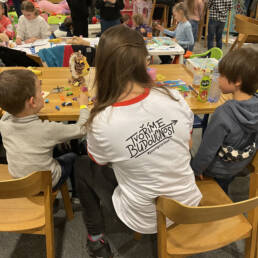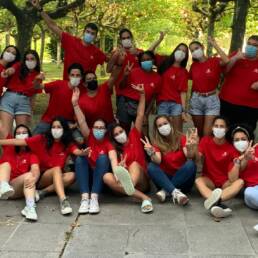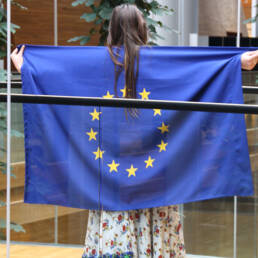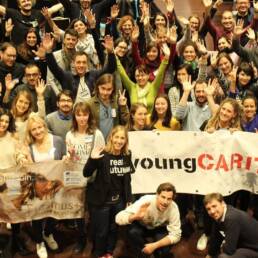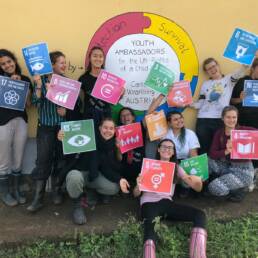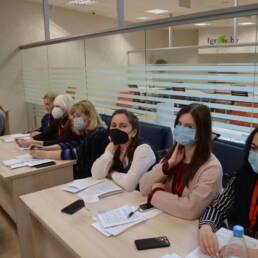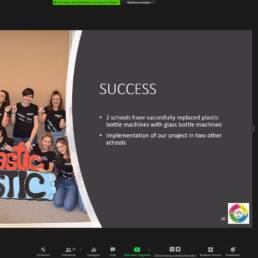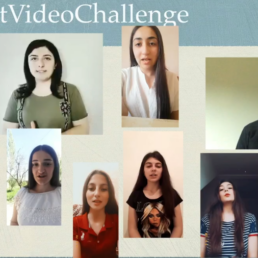Author
Agnieszka Zarzyńska
Institutional Development Officer – Youth Engagement
Tel: +32 (0)2 235 26 85
azarzynska@caritas.eu
During his pontificate, Pope Francis has put an emphasis on two very important issues – youth and ecology.
His encyclical Laudato Si calls people of goodwill to take care of our common home, and is a strong voice in the contemporary ecological crisis. It inspires not only people of faith but also activists, politicians, families and many more, who have decided to act to save the planet. Also, during the Synod on Young People, both in the exhortation Christus Vivit and other speeches, the Pope Francis stressed the necessity to develop new ways of communicating and building a relationship with youth so as not to lose them from the Church. Pope Francis points out that the youth are not only the future of our world but are also the present.
Both issues become even more important when we put them together. Saving our common home is crucial for youth because they will suffer the most from the consequences of climate change. Therefore, not only do we have to fight to leave the planet in a good state for them, we also have to acknowledge their crucial role in taking care of our common home. Let them take ownership of their future.

Youth in action
Young people all around the world stand up for the climate. They are inspired by Greta Thurnberg and go on strike every Friday. There are many young Catholics who are deeply inspired by the encyclical Laudato Si and want to put their faith into action.
On this note, I would like to share my experience from the youth retreat that took place in Alton, Great Britain, in late August. It was organised by CIDSE, a catholic humanitarian umbrella organisation, and CAFOD, a member of our Caritas family. I want to share it to show that young Catholics are not only deeply concerned with climate change but also are keen to prepare themselves to tackle it in a very professional and deeply spiritual way.
I am from Poland. You may think that climate change doesn’t have a big impact on my country (at least for now) compared to the global south. Unfortunately, every year we have been experiencing longer and longer droughts. When the Polish delegation (composed of Caritas Poland employees and Caritas Laudato Si animators) arrived in Manchester to head to Alton Castle, the place where the retreat took place, I was amazed by the intensely green hills and meadows we were passing by. In central Poland, the hills and meadows are now burnt by the sun and it is hard to find such a green landscape. So I was admiring the view hoping that one day I will be able to see a similar one in Poland.
When we arrived in the Castle I was amazed again – by the Castle itself, looking a bit like a catholic Hogwarts, and by the big group of young, enthusiastic people from all over the world. There were delegations from Canada, Peru, India, Mozambique and many European countries like the UK, Belgium, Italy, Austria, Germany, Slovakia, Romania and Poland.
We spent almost all week together reflecting on Laudato Si and planning future actions.

The camp structure was based on the Franciscan methodology of See, Judge, Act. To begin with we met with the climatologist Adam Levy who explained to us what led to climate change and how to tackle it. As a known YouTuber he also taught us how to communicate climate change in an effective way. We created short films in which we tried to motivate people from different social groups to act for our common home.
The next part of the camp was dedicated to Laudato Si. We met with Fr Martin Poulsom SDB who guided us through some fragments of Laudato Si and helped us understand what led to the ecological crisis from a spiritual perspective. He encouraged us to analyse our attitudes and see which ones still need an ecological conversion.
The final part of the camp was dedicated to the political action. We learnt about citizens who had addressed their representatives in government and we discussed the best ways to address politicians in our countries. One may wonder, should Catholics engage in politics? But during this retreat, we could see that political action is rooted in Catholic Social Teaching. It obliges Catholics to take a stand and take care of our communities and the environment. We are called to put our faith into action. Young people especially have an important role to play in taking care of our common home as it is their future at stake, and without their engagement and talents we will not be able to save the planet.

In the evenings we had the opportunities to get to know each other better, to learn about our differences, our motivations and cultures. We had a space to exchange – good practices, experiences and inspirations. Not to mention our traditional food, songs and dances. The youth retreat in Alton Castle was a time of learning, celebrating and being energised to act in our local communities. It was a time of growing in hope for the future, because of the young heroes who have decided to answer the call of pope Francis, to pray and act for the poor and for the earth.



